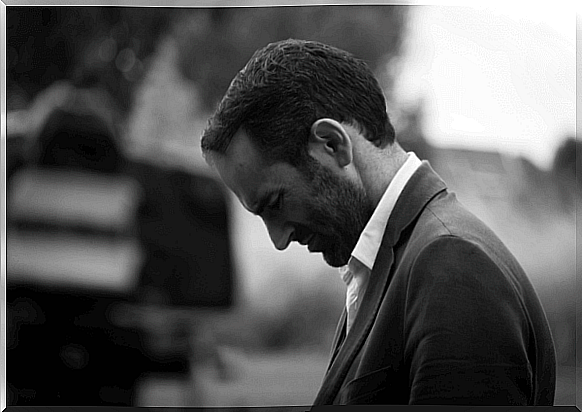How To Help A Person With An Unstable Personality

Few personality disorders are as complex and debilitating as unstable personality disorder. We could talk about its treatment, biology, or psychology, but the patient also has his or her psychosocial environment that we need to consider.
The family and friends of a person with an unstable personality do not know what to do, what not to do, how to help them and how to take care of them. Hence the topic of this article: how can we help a person with an unstable personality.
Quite often, when we talk about mental illness or psychological disorders, we just tend to list the symptoms, their origins, and the factors that cause them. But we forget one side of it.
We forget to reflect on the personal and relative world of the person suffering from this disorder. While it may be hard for us to think, they may feel lost, repressed, and imprisoned, by their own minds.
Every psychologist knows that nothing is as challenging to evaluate and treat as personality disorders. They show a lot of symptomatic overlaps, a lot of false realities (bad diagnoses), and a huge psycho-pathological labyrinth is often seen through the fingers.
True, manuals like the DSM-5 will help clarify some of the features of the disturbance. But it’s easy to see how it can be really hard to know how to help a person with an unstable personality.
The families of people suffering from this condition know that not everything their loved ones suffer from can be found in any books. Most of the time, their instability, their paranoid thoughts, their existential emptiness, and the objects and direct victims of their dichotomous thoughts are closest to the sufferer: their loved ones.
Therefore, it is important to consider the family environment of a person with an unstable personality.

The most common symptoms in people with an unstable personality
People with an unstable personality are characterized by instability in their personal relationships as well as low self-esteem.
It is common for them…
- Extreme mood swings.
- They can glorify their loved ones only to belittle and humiliate them later.
- Chronic feelings of emptiness and rejection.
- Paranoic thoughts or…
- Suffering from self-harm or a tendency to self-destruct.
- Uses a wide range of defense mechanisms, both prohibition and projection. This makes it even more difficult for them to become aware of their illness and take responsibility for themselves.
It should be noted that, as in many other psychological states, there is no “magic cure” for an unstable personality. There is no infallible therapy that would make this roller coaster of mood swings, fear, and emptiness inoperable.
But we have treatments at our disposal that can restore emotional balance and develop the quality of the relationship. This is the first step towards knowing how to help a person with an unstable personality.
There is one essential part of our efforts to care for a person with this disorder that we cannot ignore: family support. This is one of our basic tools for mental illness. We need to provide adequate coping strategies for their personal environment and learn to live together to help them.

How to help a person with an unstable personality
People close to the patient often feel guilty. They have doubts, they feel responsible for the worsening phase, for self-destruction. They feel like they should have known, said something much earlier. When one of our loved ones suffers from an unstable personality, we need to consider these things:
- We have not caused this disturbance.
- We cannot improve it.
- We can’t control it.
Then, once these things are clear, we can begin to help our loved ones. Let’s continue with a few practical tips:
- Nothing is more important than understanding what is happening and why he is behaving the way he is behaving.
- As we said at the outset, this disorder is both complex and overwhelming. Sometimes, in addition to the disorder itself, the patient experiences depression, bipolar disorder, eating disorders, and substance abuse.
- It is essential to know all the symptoms and characteristics.
- Despite the fact that this disorder is treatable, patients often tend to avoid getting help or they skip treatments in between.
- It is therefore essential that we encourage them to continue with therapy and all necessary medications.
How to help a person with an unstable personality: communication
People with an unstable personality can say cruel and irrational things. They are afraid of being rejected, so they erupt furiously and using verbal slander.
- Experts say it’s like “auditory dyslexia.” They hear miscellaneous words without any context.
- When they are verbally aggressive, we should tell them that “now is not a good time to talk.” Then we should make it clear to them how important they are to us and that we want to talk to them when they are calmer.
- Once they have calmed down, we need to focus on their feelings more than their words to make them feel valued.
- It doesn’t matter if their words make sense. We need to make them feel that they have been heard and that we support them.
- If they fall back into aggression, it’s better to give them room instead of drifting into arguing with them.

Set healthy boundaries
One of the most effective ways to help a person with an unstable personality is to help him or her control his or her behavior. To do this, we need to set boundaries and ask him to agree to those boundaries for self-regulation, and above all, to understand the importance of this treatment and staying within it.
- These limits and rules must be accepted by all family members.
- What is and what is not allowed should be defined and discussed in advance.
We must say what is not permissible clearly but tenderly. “We love you and we want this to work. You have to understand that if you talk to us that way or do something about us, you will harm us as well as yourself. We cannot accept that, and we ask that you make that change for all of us. ”
What we should not do with a person who suffers from an unstable personality
- Threaten or make threatening claims
- Tolerate abusive behavior
- Allow them to stop treatment
- Ignores suicide threats
To help a person with an unstable personality, we need to take care of ourselves
We can take care of ourselves:
- If we don’t isolate ourselves or build our whole lives around a person with an unstable personality.
- If we do not neglect our health.
- By going to support groups with people in a similar situation.
- If we learn stress management techniques.
Finally, this collaboration between the patient, his family, and the professionals caring for him is not easy, but it is nonetheless possible. Helping a person with an unstable personality is a daily challenge. A bumpy but rewarding path where we can minimize impulsivity and sow the seed for rational decision-making.









